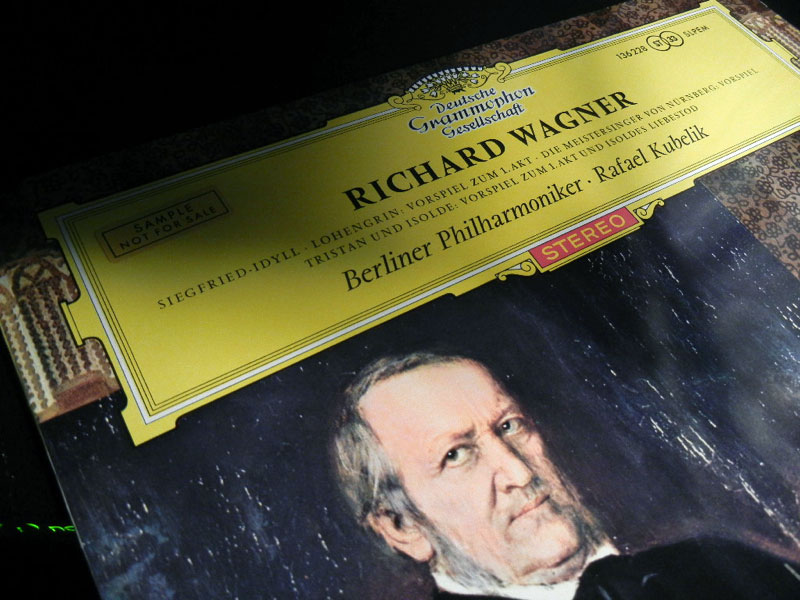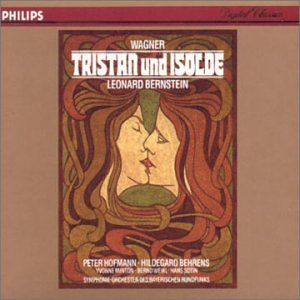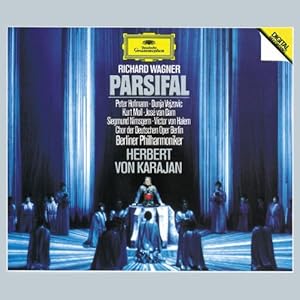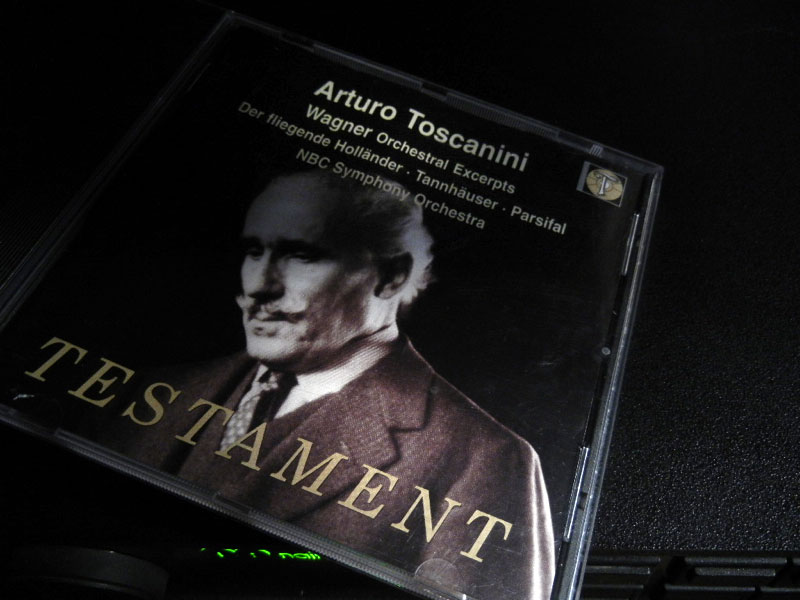Hi all, with the bicentennial of Wagner's birth in 2013, thought it'd be fun to share with you some personal reviews and notes of his operas, which I've gathered over the years. Although I listened to and own many recordings, this is not a complete survey. One opera at a time - and we start with a lengthy one:
Part 1: Tristan und Isolde
Tristan, Wagner's most ambitious and influential opera, is the essence of Schopenhauer set to drama and music. Wagner had become familiar with the work of Schopenhaur and his idea of the world driven by unachievable desires in the mid 1850s, and subsequently started work on an opera devoted entirely to this idea. While working on it, he became involved with Mathilde von Wesendonck, the wife of his then-sponsor (when Wagner's wife found out, this led to one his several exiles). He set five of Mathilde's poems to music, the Wesendonck Lieder, two of which were studies for Tristan and include themes that made it into the Act II love duet and the Act III prelude of the opera. The lead parts of the opera, Tristan (tenor) and Isolde (soprano) are generally regarded to be among the heaviest operatic roles ever written, and have been difficult to cast since the premiere in 1865.
The most famous recording is the 1952 FurtwÄngler - an ambitious and conscious undertaking by Walter Legge to preserve a famous partnership, Ludwig Suthaus, Kirsten Flagstad and Wilhelm Furtwangler. Furt and Legge didn't like one another but set their differences aside. Famously, Legge's wife, Elisabeth Schwarzkopf, dubbed in Isolde's high Cs. It's an unmissable recording, but I have to say despite the very capable voices, they do sound a bit long in the tooth.
In 1966, Philips recorded the Tristan live, but one act at a time, under BÖhm, with Birgit Nilsson and Wolfgang Windgassen. BÖhm is fast in an opera that is supposed to be slow, the singers do a great job although Windgassen sounds overparted at times. It's many people's favorite but for me, it misses the essence.
There are a number of highly regarded live performances under Karajan, but his first and only studio recording for EMI happened in 1972, with Jon Vickers and Helga Dernesch. Sadly not one of Von K.'s most inspired performances, but his singers are hugely impressive and despite Vickers' dodgy German pronunciation, sound idiomatic.
Early 1980s, Carlos Kleiber and Lenny Bernstein committed their readings to disc. Both are controversial. Kleiber was never happy in the studio and apparently became so distressed with René Kollo's Tristan, he ran out before the sessions were complete and never returned to the studio. DG managed to complete the recording from practice takes. The result is quite special, with a Mozartean touch and sensitive singers - but for this reason, very studio bound.
Bernstein did it live, but like BÖhm, one act at a time to give the singers rest between acts. It's the slowest performance ever recorded - the original CD issue consisted of 5 discs. Hildegard Behrens and Peter Hofmann are committed and have nice voices, but a bit small for the parts. All in all, my personal favorite - it's SLOW but intense, and one of Bernstein's supreme achievements.
In 2004, DG released another live performance, under Thielemann. He is good, but his singers aren't memorable. Thomas Moser gives it his best shot, drowns in Act II but is surprisingly good in Act III. Deborah Voigt has a big voice but doesn't really impress at any time.
EMI followed in 2005 with the - for now - most recent studio recording, under Tony Pappano, with Placido Domingo and Nina Stemme. Stemme sounds very good and gives a credible interpretation (she does miss some of the irony in the role, a small thing compared to what is there). Domingo is a big surprise, despite the fact that he was in his 60s at the time of the recording, he sounds very good and up to the task (helped by the engineers, but still). He doesn't sound authentically Wagner, and he is careful - but the performance is quite the achievement. Pappano conducts assuredly, fastish but not hurried.
All in all, many of the recordings have merit and none is ideal. FurtwÄngler and Karajan are generally safe recommendations, as is Pappano if you like Domingo, but I love the Bernstein for its focus. Just the beautifully sustained overture, clocking in at almost 15 minutes, is a work of art.
Comments welcome!
Cheers,
EJ
Posted on: 06 January 2013 by kuma

So, whilst I am still waiting for Böhm and Lenny set of T&I, I decided to give orchestra version of some Wagner's opera. There are no vocals included on this Kubelik recordings. I wasn't too nuts about his direction on Schumann and Brahms symphonies in the past but he's excellent with Wagner's music, I think. No vocals but these tunes are pretty graphic and pictorial. ( tone poems? )
Included in this album are:
A1 Siegfried-Idyll
A2 Lohengrin, Prelude (Act I)
B1 Die Meistersinger Von Nürnberg (The Mastersingers of Nuremberg), Prelude
B2 Tristan Und Isolde, Prelude (Act 1) And Isoldes Liebestod
Siegfried-Idyll gives sweet flowy melody line with a touch of sadness. There isn't much drama throughout and Kubelik gives somewhat of a generic rendition. Big and lush landscape is all I can figure out.
Lohengrin Prelude starts out with a finelined string whisper then the horns join in. Creates a feel of dawn. A fresh start. Delicate Strings carry the most of story telling. Kubelik builds it up to the dramatic finale then the score ends with a whisper. A nice touch.
Nürnberg Prelude begins with a grandeur fanfare. Kubelik maintains a strolling tempo but it's big and grand, a sort of fees I expect from a Wagner program.
And finally the contrasting Tristan und Isolde Prelude is all dark and gloom. Sense of hopelessness and despair. A bitter sweet beautiful melody. It has many repeated easily recognizable chords and melody lines. A slow build for the Leibestod is just a great tear jerker.
I could see Lenny schmultzing up on the finale. 
Posted on: 14 January 2013 by kuma

Ok. So this is a Tristan und Isolde 'Highlight' vinyl with Böhm with following excerpts from the full blown version.
A1 Act 1: Prelude
A2 O Sink Hernieder, Nacht Der Liebe (Liebesduett II. Akt: Isolde-Tristan)
A3 Einsam Wachend In Der Nacht (Brangänes Ruf II. Akt, 2. Szene)
B1 So Stürben Wir, Um Ungetrennt (Love Duet-Conclusion)
B2 Act 3: Prelude [4:15]
B3 O Wonne! Nein! Er Regt Sich, Er Lebt! (Tristan's Dream III. Akt, 1. Szene: Tristan-Kurwenal)
B4 Mild Und Leise Wie Er Lächelt (Isoldes Liebestod)
The only tunes I was familiar prior to listening is the Act 1 Prelude and Isolde Liebestod.
Act 1 Prelude takes a walking tempo with an ellegant large sweeping tidal wave. EJS mensions earlier that this is fast for opera but the orchestra versions I have heard is much faster than this!
I am not certain how to judge vocals but both the soprano and tenor sound a bit upright lacking warmth. Nilsson's voice gets slightly hardened at upper register. The idea of voice as an instrument is still a hard concept for me to grasp at times, I much prefer the music without their voices or lyrics.
Particularly at the duet, it turns into a screaming match in that I had an urge to yell out 'STFU'. I certainly can do without Nilsson's hard voice on Isolde Liebestod. Orchestra sounds spotty and doesn't have the usual flow, there either. Not sure if this is intentional to accommodate the soprano.
I am a complete novice but I had a much easier time with Mozart operas ( Böhm conducting also ) than this piece. If their voices were rounder and warmer, it would be much easier to listen. Otherwise, I got a better drama from Toscanini or Kubelik's orchestration without any voices.
Let's see what Lenny's Tristan is like.
A tough nut to crack, I'm sure and this wasn't it.
Posted on: 20 January 2013 by VladtheImpala
This week, I've been listening to the Bohm live Tristan und Isolde from 1966(?) on CD.
I'm not familiar at all with Wagner's operas. My preference in opera is for Mozart, Puccini, Verdi i.e. fairly "vanilla" and a liking for a hummable melody!
Please bear in mind that my comments below are from someone who is only just starting out in classical music - clearly, I'm no expert and I'm unlikely to bring you any insight which has eluded them!
SQ on the 3-CD set is warm and eminently listenable for a recording of this age. There's little audience or stage noise and what there is doesn't really intrude. I detect a bit of instability in the horn section, particularly in the Act 1 prelude.
I have read elsewhere that this opera was written during a break in writing the Ring cycle, so I'm expecting some stylistic similarities.
The opera is in three Acts, each beginning with a prelude. Those who do not enjoy the singing may find some enjoyment from the Preludes alone.
With the other composers I mention above, the arias, with which we are most familiar, are regular and frequent interludes in the performance. These are often linked by a semi-spoken recitative or musical theme.
Not so here - the Preludes introduce a musical theme which is expanded upon in the respective Act. There are themes (more like melodic fragments to me) introduced which identify a charachter, object, idea etc. I would recommend listening with the synopsis close to hand!
Each of the Acts is a long (50+ mins), near-continuous piece of music. A device is used where the musical conclusion (e.g. a return to a home key or other formal conclusion) is deferred. While this creates some dramatic tension, I found it pretty annoying. With Mozart, you'll get a brilliant tune every 5 - 10 minutes! I also found that I couldn't retain the melody lines in my mind for very long after listening.
Which brings me to the orchestra and singers. The demands on the orchestra are large, but nowhere near those on the singers. There are long periods where only 2 or 3 singers perform. They must do this over wave after wave of the orchestra playing near-flat out - a formidable acheivement of volume and stamina. I think the singers here, particularly Wolfgang Windgassen and Birgit Nilsson in the title roles, are marvellous.
I feel that there is much I'm missing after a first listen and it is clear that I don't yet understand the musical language used in this opera. There is enough in it, for me, to make it worth a repeated effort - unlike the poor fellow on another thread who has 11 CD's worth of Shostakovich to get through!
Regards,
Vlad






